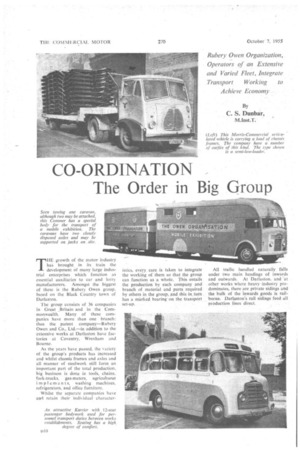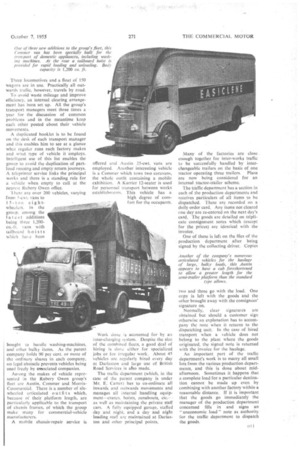CO-ORDINATION The Order in Big Group
Page 54

Page 55

If you've noticed an error in this article please click here to report it so we can fix it.
THE growth of the motor industry has brought in its train the development of many large industrial enterprises which function as essential auxiliaries to car and lorry manufacturers. Amongst the biggest of these is the Rubery Owen group, based on the Black Country town of Darlaston.
The group consists of 36 companies in Great _Britain and in the Commonwealth. Many of these companies have more than one branch: thus the parent company—Rubery Owen and Co., Ltd.—in addition to the extensive works at Darlaston have factories at Coventry, Wrexham and Bourne.
As the years have passed, the variety of the group's products has increased and whilst chassis frames and axles and all manner of steelwork still form an important part of the total production, big business is done in tools, chains, fork-trucks, gas-meters, agricultural i rn plem en t s, washing machines, refrigerators, and office furniture.
Whilst the separate companies have and retain their individual character istics, every care is taken to integrate the working of them so that the group can function as a whole. This entails the production by each company and branch of material and parts required by others in the group, and this in turn, has a marked bearing on the transport set-up. All traffic handled naturally falls under two main headings of inwards and outwards. At Darlaston, and at other works where heavy industry predominates, there are private sidings and the bulk of the inwards goods is railborne. Darlaston's rail sidings feed all production lines direct. Three locomotives and a float of 150 wagons are in use. Practically all outwards traffic, however, travels by road.
To avoid waste mileage and improve efficiency, an internal clearing arrangement has been set up. All the group's transport managers meet three times a year for the discussion of common problems and in the meantime keep each other posted about their vehicle moveinents.
A duplicated booklet is to be found on the desk of each transport manager and this enables him to see at a glance what regular runs each factory makes and what type of vehicle it 'employs. Intelligent use of this list enables the group to avoid the duplication of partload running and empty return journeys. A teleprinter service links the principal works and there is a standing rule for a vehicle when empty to call at the nearest Ruhery Owen office.
't here are over 200 vehicles, varying from 5-cw t. vans to 1 5-ton eightwheelers, in the group, among the I atest additions being three 1,200cu.-it. vans with tailboard hoists which have hecn bought to handle washing-machines, and other bulky items. As the parent company holds 90 per cent, or more of the ordinary shares in each company, no legal obstacle prevents vehicles being used freely by associated companies.
Aniong the makes of vehicle represented in the Rubery Owen group's fleet arc Austin, Commer and MorrisCommercial. There is a number of sixwheeled articulated outfits which, because or their platform length, are particularly applicable to the transport of chassis frames, of which the group make many for commercial-vehicle manufacturers.
A mobile chassis-repair service is offered and Austin 25-cwt. vans are employed. Another interesting vehicle is a Commer which tows two caravans, the whole outfit containing a mobile exhibition, A Karrier 12-seater is used for personnel transport between works establishments. This vehicle has a high degree of comfort for the occupants.
Work done is accounted for by an inter-charging system. Despite the size of the combined lleets, a good deal of hiring is done either for specialized jobs or for irregular work. About 45 vehicles are regularly hired every day at Darlaston and large use of British Road Services is also made.
The traffic department (which, in the case of the parent company is under Mr. E. Carter) has to co-ordinate all inwards and outwards movements and manages all internal handling equipment—cranes, hoists, runabouts, etc.as well as maintaining the private staff cars. A fully equipped garage, staffed day and night, and a day and night loading staff are maintained at Darlaston and other principal points. Many of the factories are close enough together for inter-works traffic to be successfully handled by interchangeable trailers on the basis of one tractor operating three trailers. Plans are now being considered for an internal tractor-trailer scheme.
The traffic department has a section in each of the production departments and receives particulars of all items to be dispatched. These are recorded on a daily order card. Any items not cleared one day are re-entered on the next day's card. The goods are detailed on triplicate consignment notes which (except for the prices) are identical with the invoice.
One of these is left on the files of the production department after being signed by the collecting driver. Copies two and three go with the load. One copy is left with the goods and the other brought away with the consignees' signature on, Normally, clear signatures are obtained but should a customer sign otherwise an explanation has to accompany the note when it returns to the dispatching unit. In the case of hired transport when a vehicle does not belong to thc plant where the goods originated, the signed note is returned with the invoice for the haulage.
An important part of the traffic department's work is to marry all small lots from the various production departments, and this is done about midafternoon. Sometimes it happens that a complete load for a particular destination cannot be made up even by combining with another factory within a reasonable distance. If it is important that the goods go immediately the manager of the production department concerned fills in and signs an "uneconomic load" note as authority for the traffic department to dispatch the goods.
















































































































